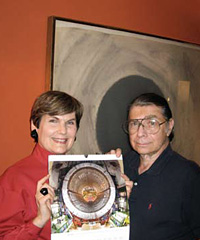Essay: Lynn Hecht Schafran
 |
| Photo: David Schafran |
Vacationing at the LHC
In August 2008 I built my summer vacation around a trip to CERN, the European high-energy physics laboratory near Geneva. I am a womens rights lawyer and a former art historian, and it might seem unusual that someone so totally outside the field would consider that fun.
My CERN visit actually culminated a ten-year interest in the Superconducting Super Collider. In the late 1980s, my real estate-developer husband wanted to participate in the Super Collider project, then planned for Waxahachie, Texas. He bought land adjacent to the site, intending to build an industrial park that would service construction and maintenance of the collider. Obviously there was an economic interest at play, but what attracted him to this location, as opposed to others, was the thrilling scientific enterprise expected to take shape there.
Then we watched in disbelief as Congressional funding for the project floundered and finally died in 1993. To us the cancellation seemed so short-sighted. How could Congress cede Americas primacy in particle physics? How could it toss the chance to uncover wonders with a Super Collider vastly more powerful than what would be possible in Europe?
Over the next years we watched plans emerge for CERNs Large Hadron Collider, a 17-mile ring beneath the Swiss-French border that will produce particle collisions seven times more energetic than ever before achieved. I began reading more and more about particle physics a definite departure from the days when I left the Bronx High School of Science at the start of my junior year for fear that having to take physics and chemistry simultaneously would destroy my grade-point average. Although I understood only a scintilla of what I read, I was fascinated.
As the LHC start date neared, I found myself clipping more and more articles about it and feeling personally dismayed by the delays. I knew I would be following the news from CERN closely and wanted a concrete sense of the place from which it was emerging; hence my summer vacation.
Our tour was far more than I anticipated in every way: more than three hours long, with three CERN physicists leading the way. I now understand why visitors must be limited to one tour a year.
Back home I look with awe at the photographs in my CERN 2008 calendar and listen to my Particle Physics for Non-Physicists DVD series in the hope of understanding a bit more of what is being investigated there. I am among the myriad fans saddened that the LHC will not be operational until later in 2009, but I am comforted by something I learned from the physicist who led our official tour group.
He explained that the amount of data the LHC will produce is so staggering that even on the eve of activation, CERN physicists were still trying to determine how to best decipher which data were old news that should be discarded and which showed something new. So, painful as the delay may be, it provides more time to meet this challenge and perhaps, in the end, will prove a boon.
Congratulations to everyone involved in this extraordinary project. I cannot wait to see what you discover.
Lynn Hecht Schafran is senior vice president of Legal Momentum and director of the organizations National Judicial Education Program to Promote Equality for Women and Men in the Courts. She and her husband, Larry, live in New York City.
Click here to download the pdf version of this article.


